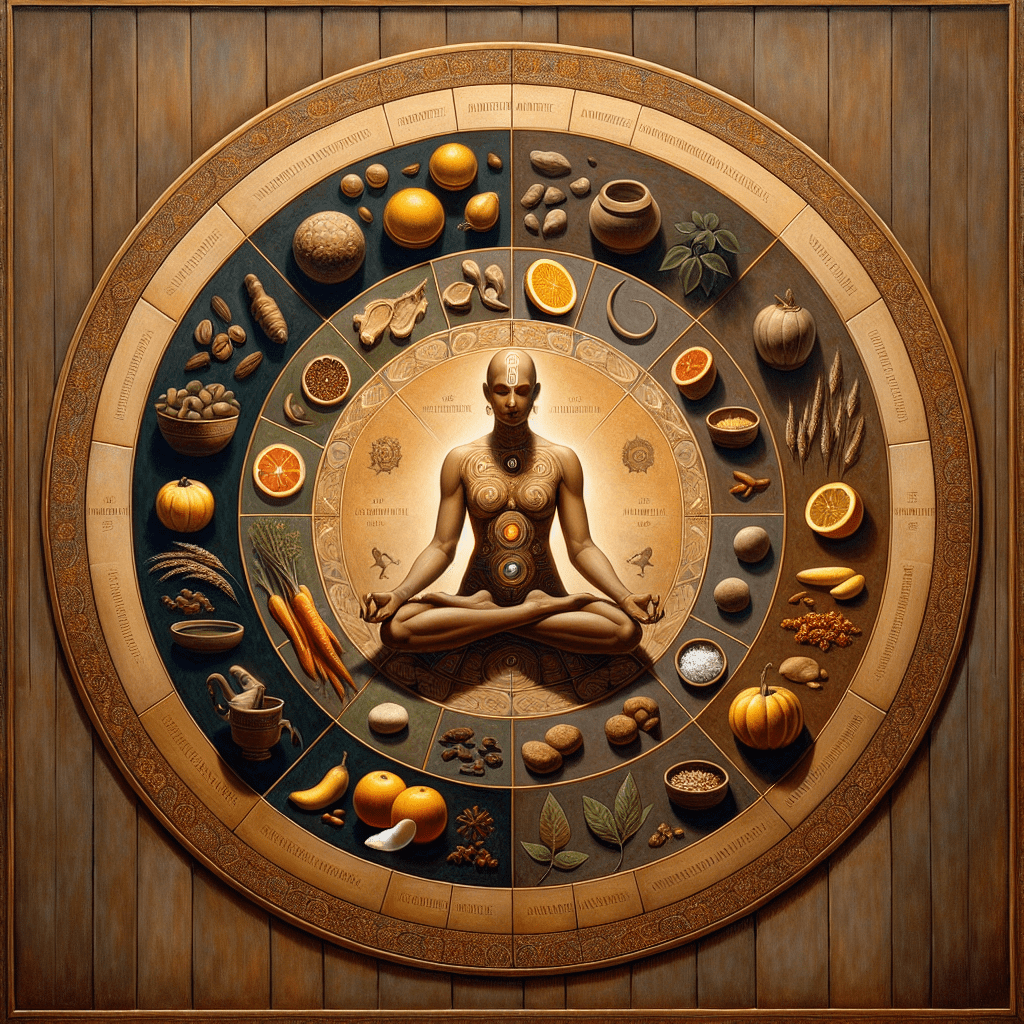In a world where health trends come and go with each passing season, there’s something deeply reassuring about ancient wisdom that has stood the test of time. Eastern medicine, particularly Traditional Chinese Medicine (TCM), has recognized for thousands of years what modern science is now confirming – our bodies function in harmony with nature’s cycles, and our health needs shift with the changing seasons.
But here’s where things get really interesting: artificial intelligence, that most modern of innovations, is now breathing new life into these age-old seasonal health eastern practices. This fascinating intersection of ancient wisdom and cutting-edge technology isn’t just a curiosity – it’s potentially revolutionizing how we understand and care for our bodies throughout the year.
The Timeless Wisdom of Seasonal Health in Eastern Medicine
Eastern medicine has always viewed humans as microcosms of the natural world. Just as nature transitions through spring, summer, late summer, autumn, and winter, our bodies experience similar energetic shifts that require different approaches to maintain balance and health. This concept of seasonal health eastern practices has guided wellness routines across Asia for millennia.
In TCM, each season corresponds to specific organs and elements. Spring, governed by the Wood element, connects to liver health and emphasizes movement and growth. Summer aligns with the Heart and Fire element, focusing on maintaining coolness without depleting energy. Late summer relates to the Earth element and Spleen, emphasizing digestive health. Autumn associates with the Lungs and Metal element, prioritizing immunity and respiratory health. Winter, linked to the Kidneys and Water element, emphasizes rest and energy conservation.
These seasonal connections aren’t mere philosophical constructs – they translate into practical health guidance about diet, activity, emotional well-being, and preventative care. For generations, people have adapted their lifestyles according to these seasonal health eastern principles, consuming warming foods in winter, cooling foods in summer, and adjusting sleep patterns and exercise routines to match nature’s rhythms.
AI Meets Ancient Wisdom: A Powerful Partnership
Now imagine taking this profound seasonal health eastern knowledge and enhancing it with artificial intelligence’s analytical power. This isn’t about replacing traditional wisdom but amplifying it through technology that can process vast amounts of information and identify patterns beyond human observation capabilities.
AI is helping to bridge the gap between Eastern and Western medical approaches by validating traditional practices through modern research methods. Machine learning algorithms can now analyze thousands of years’ worth of Eastern medical texts, clinical records, and treatment outcomes to identify effective patterns that might otherwise remain buried in ancient tomes. This integration of Eastern Medicine AI creates powerful new insights for personalized healthcare.
“The integration of AI into Traditional Chinese Medicine represents a key development in the evolution of the medical field,” explains Dr. Mei Zhang, a TCM practitioner who has embraced technology in her practice. “AI is augmenting our diagnostic performance and treatment precision, not replacing the human element that’s so essential to Eastern medicine.”
This fusion is particularly evident in how EASTCHI AI, a pioneering system developed by HerbalsZen, incorporates Five Element Theory into its analysis. By examining a user’s constitutional type – whether they tend toward Wood, Fire, Earth, Metal, or Water dominance – the AI can provide tailored recommendations that respect individual differences while accounting for seasonal influences.
Data-Driven Insights: How AI Enhances Eastern Diagnostics
Traditional Chinese Medicine diagnostics rely heavily on the practitioner’s skilled observation – examining the tongue, reading pulses, and conducting detailed patient interviews. These methods, while powerful, contain inevitable subjectivity. This is where AI offers remarkable enhancements to seasonal health eastern practices.
Modern AI systems can now analyze tongue images with precision that surpasses human capability, identifying subtle color variations, coating characteristics, and shape changes that indicate specific health imbalances. One study found that AI-assisted tongue diagnosis achieved 95% accuracy in identifying patterns associated with certain health conditions – significantly higher than the average human practitioner’s accuracy.
Similarly, pulse diagnosis, that subtle art of reading the quality of blood flow at different positions on the wrist, is being enhanced through wearable technology that can continuously monitor pulse qualities and detect patterns associated with seasonal health eastern imbalances.
What makes these technological advancements particularly powerful is their ability to incorporate environmental data. AI systems can analyze weather patterns, air quality, pollen counts, and seasonal viral trends, correlating them with individual health metrics to provide truly contextualized recommendations.
“By analyzing vast amounts of TCM data, including patient records, diagnostic information, and treatment outcomes, AI offers insights that might take a human practitioner decades to accumulate,” notes Dr. Liang Chen, a researcher specializing in AI applications for traditional medicine.
Personalized Seasonal Health: AI-Enhanced Recommendations
Perhaps the most exciting application of AI in seasonal health eastern medicine is the development of highly personalized treatment plans. Traditional Chinese Medicine has always recognized that no two people are identical – what works for one person may not work for another, even if they present similar symptoms.
AI takes this personalization to unprecedented levels by continuously learning from individual responses. For example, EASTCHI AI doesn’t simply recommend generic “cooling foods” during summer for everyone. Instead, it analyzes how your specific constitution responds to heat, examines your health history, considers your geographic location and current weather patterns, and even factors in your activity level to recommend precisely which foods will help you maintain balance.
During winter, when TCM traditionally emphasizes kidney health and energy conservation, AI can help determine exactly how much rest you need based on your constitutional type and current health status. It might recommend specific herbs like huang qi (astragalus) for someone with weak immunity or suggest precise acupressure points to stimulate based on your unique energy patterns.
One user of HerbalsZen’s EASTCHI AI shares: “I’ve always struggled with seasonal transitions – especially fall to winter. The personalized recommendations I’ve received have transformed my experience. The AI suggested specific dietary adjustments and lifestyle changes based on my constitution type that have helped me maintain energy levels I never thought possible during winter months.”
This level of personalization represents a quantum leap beyond traditional seasonal health eastern guidelines, which, while valuable, couldn’t possibly account for all individual variations and modern environmental factors.
Scientific Validation: How AI Builds Bridges Between East and West
One of the most significant contributions AI makes to Eastern medicine is providing scientific validation for traditional practices. For centuries, Western medicine viewed practices like acupuncture, herbal medicine, and seasonal dietary adjustments with skepticism, largely due to different methodological approaches to research and evidence.
AI is helping bridge this divide by analyzing outcomes and identifying mechanisms of action that satisfy Western scientific standards while honoring Eastern philosophical frameworks. Machine learning algorithms can detect subtle patterns in treatment responses that might be missed in conventional research designs.
For example, reinforcement learning algorithms now analyze the interactions and effects of various herb combinations in TCM formulations, identifying synergistic relationships that explain why certain combinations work better than individual herbs – something traditional practitioners understood empirically but couldn’t explain in biochemical terms.
This validation enhances the credibility of seasonal health eastern approaches while making them more accessible to people who might otherwise hesitate to try traditional methods. When AI confirms that certain cooling herbs reduce inflammation biomarkers during summer months or that specific qi-building practices improve immune function during seasonal transitions, it creates confidence that spans cultural and philosophical divides.
As HerbalsZen’s philosophy emphasizes, this isn’t about choosing between Eastern and Western approaches but integrating the best of both worlds. AI serves as the translator between these different healing paradigms, helping users benefit from ancient wisdom without abandoning modern medical advances.
Cultural Preservation Through Technological Innovation
Perhaps counterintuitively, AI is helping preserve traditional seasonal health eastern practices that might otherwise be lost in our fast-paced modern world. As younger generations increasingly rely on digital tools for health guidance, integrating traditional wisdom into AI platforms ensures these practices remain relevant and accessible.
EASTCHI AI, for instance, doesn’t just tell users what to eat or which herbs to take – it explains the underlying Eastern medical principles, helping educate people about concepts like yin-yang balance, the Five Elements, and seasonal energetic transitions. This educational component helps preserve cultural knowledge that has been passed down through generations.
Furthermore, AI is helping document and analyze regional variations in Eastern medical practices. Traditional Chinese Medicine isn’t monolithic – it evolved differently across various regions of China and throughout other Asian countries. By digitizing and analyzing these regional approaches, AI helps preserve diversity within traditional medicine that might otherwise be homogenized or forgotten.
Looking Forward: The Evolution of Seasonal Health Through AI
As we look to the future, the partnership between AI and seasonal health eastern practices promises even greater advances. Researchers are developing AI systems that can predict seasonal health risks before symptoms appear, potentially preventing illness rather than just treating it.
Imagine receiving a notification that your specific constitution type is likely to experience respiratory sensitivity in the coming autumn weeks, along with personalized recommendations for preventative herbs, foods, and practices tailored to your exact needs. This proactive approach aligns perfectly with Eastern medicine’s emphasis on prevention over treatment.
The integration of wearable technology with AI analysis will further enhance personalization. Continuous monitoring of heart rate variability, skin conductance, sleep patterns, and activity levels – all interpreted through the lens of Eastern medical theory – will provide unprecedented insights into how your body responds to seasonal transitions.
HerbalsZen’s approach with EASTCHI AI exemplifies this forward-thinking integration. By analyzing users’ constitutional types through Five Element Theory while incorporating modern health metrics, it creates a bridge between ancient wisdom and contemporary science that honors both traditions.
Embracing the Seasons of Life with AI-Enhanced Eastern Wisdom
The marriage of artificial intelligence with seasonal health eastern practices represents more than technological innovation – it’s a philosophical reconciliation between seemingly opposing worldviews. Eastern medicine’s holistic, cyclical understanding of health finds new expression through AI’s pattern-recognition capabilities, while AI’s analytical strengths are tempered by Eastern medicine’s profound appreciation for individual uniqueness and natural rhythms.
As we navigate the increasing complexities of modern life, this integration offers something precious: a way to remain connected to natural cycles while benefiting from technological advances. The seasonal wisdom that guided our ancestors can now be personalized and refined through AI, helping each of us find our unique path to balance throughout the year.
By embracing this synergy between ancient wisdom and modern technology, we aren’t just improving health outcomes – we’re preserving cultural heritage, bridging philosophical divides, and reconnecting with the natural rhythms that have always sustained human life. In this harmony of old and new, we may find exactly the healing approach our modern world needs.




